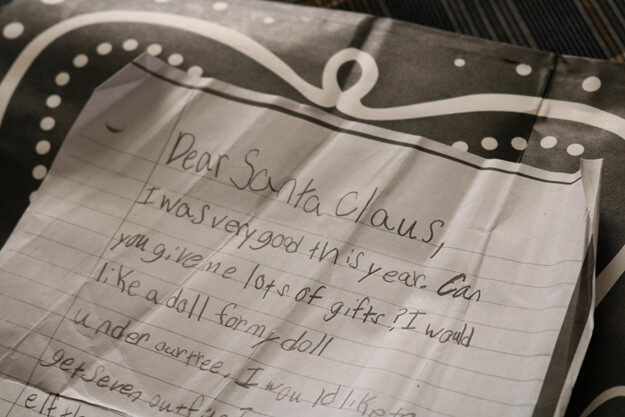5 Clues to Help Identify Learning Struggles in your Child's Letter to Santa
5 Clues to Learning Struggles in your Child's Annual Letter to Santa

Several years ago, a dad walked into my office bearing Christmas gifts for my staff.
I had met this father during his son’s evaluation and recommendation session. He was deeply concerned about his son’s inability to read, write, and spell. At that time he had very little knowledge of Dysgraphia or Dyslexia and the only thing that he was interested in discussing were my qualifications and “fixing” the problem.
So to see him standing in my doorway was a surprise.
When he laid the gift on my desk and looked me in the eyes, I could see the tears welling up. Then he told me,
I want to thank you for helping my son. I don’t know if you realize the gift that you have given me as a Dad. For years my son has been writing letters to Santa.
Every year I would dread this time of year, knowing that when my son handed me his letter, I would have to ask him to read it to me because I could not make out the words on the paper. His writing and spelling were so bad, I could not read what he had written.
This year was different. This time when he handed me his letter, I was able to read every word. Christmas came early for me this year. I could not have asked for a better gift.
I sat there speechless for a minute and then it was my turn for tears.
As a parent, I understood the magnitude of what he was saying. As a therapist, I understood the obstacles that his son had worked through to get to this point.
It is that time of year when most school age children are asked to write a letter to Santa Claus. There is something magical about looking at a letter, handwritten by a precious child, full of hope that their dream gift will appear on December 25th once their letter reaches the North Pole.
As a parent, I have kept all of the letters that my children have written. I can go back and follow their progression of learning skills and maturity just by reading their letters.
But your child's annual letter to Santa can also help to determine if your son or daughter may struggle in the areas of reading, writing, or spelling.
I was so grateful for this beautiful reminder of how a simple letter can teach a lot about a child's learning patterns.
So below are 5 warning signs that your elementary age child may be struggling and would benefit from a screening and find ways to improve their weak skills.
1. Letter reversals:
Examples include reversals - "d" for "b" as in, dog for bog -, inversions – "m" and "w", "u" and "n"-, word reversals – "tip" for "pit" - are some of the most common errors noted.
It is true that letter reversals are a common developmental skill but they should not continue to be seen in second grade and they should be limited.
2. Numerous spelling errors:
Often times students can memorize and make good grades on spelling tests, but struggle when trying to spell words in a paragraph or letter.
Spelling should be consistent. If your child can get good grades on a spelling test but not transfer this skill in a paragraph, this is a warning sign.
3. Unfinished or omitted words in sentences:
If your child’s letter shows unusual syntax and grammar structure. A good way to check is if what they wrote sounds different from how they speak, this is a warning sign.
4. Illegible handwriting:
If you are unable to read your child’s handwriting this is a warning sign.
5. Distinct difference in how your child speaks and how they write:
For example, if your child uses higher vocabulary, more descriptive words, and longer content when speaking than they use when they write, this is a warning sign.
Identifying your child’s struggle and getting them the help that they need will be the best gift that you and your child will ever receive.
IF YOU RECOGNIZE ANY OF THESE SIGNS AND SYMPTOMS, BOOK A 10 MINUTE CALL
If you've seen or suspect any number of these signs and symptoms in your child's behaviour, we urge you to schedule a complimentary 10 minute phone call with Kyra Minichan, The Cognitive Emporium founder and developer of our unique P.A.T.H. assessment and treatment approach.
Together we will take the first steps on a P.A.T.H. to discover your child's unique superpowers!

